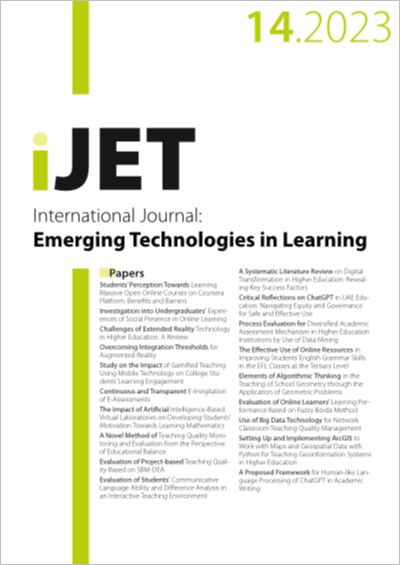Evaluation of Project-based Teaching Quality Based on SBM-DEA
DOI:
https://doi.org/10.3991/ijet.v18i14.40395Keywords:
SBM-DEA, project-based teaching, teaching quality, teaching quality evaluationAbstract
Improving the quality of project-based teaching can have several benefits for students, including the development of hands-on skills, expanded thinking abilities, a better understanding of real life situations, building connection between individuals and society, and internalizing knowledge. Therefore, conducting a scientific evaluation of quality of project-based teaching is crucial. In this study, the focus was on the process of project-based teaching, involving 120 computer science and technology students from four universities in Hainan Province. The researchers utilized the slacks-based measure and data envelopment analysis (SBM-DEA) model to measure learning efficiency of these students. Additionally, the study analyzed the insufficient investment in project-based teaching in the four universities and identified the process factors affecting quality of project-based teaching. The results show that out of the 120 students, only 24 students achieved a learning efficiency of 1, accounting for only 20% of the total. This indicates that although project-based teaching is implemented in the surveyed schools, the comprehensive improvement of students’ learning efficiency has not been achieved. The two main factors contributing to the low quality of were identified as project-based teaching aids (X-2) and project-based teaching experience (X-3). The findings of this study hold important reference value for optimizing the project-based teaching process, identifying key factors of project-based teaching quality, and promoting the adoption of project-based teaching in higher engineering education to accelerate teaching mode reform.
Downloads
Published
How to Cite
Issue
Section
License
Copyright (c) 2023 Jianmeng Ou, Dongdong Lin

This work is licensed under a Creative Commons Attribution 4.0 International License.



